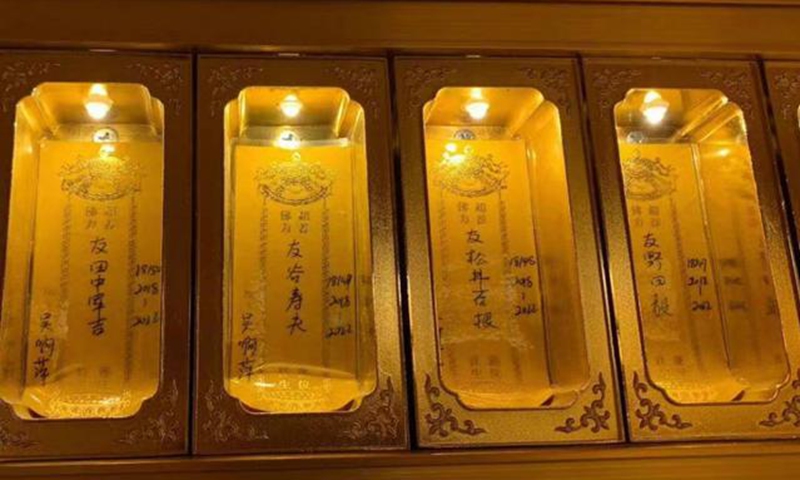The abbot of Xuanzang Temple in Nanjing, capital of East China’s Jiangsu Province, was dismissed and several religious officials were punished following public outrage over the news that memorial tablets of Japanese war criminals were found in the temple, Nanjing authorities announced on Friday.
Chuanzhen, the abbot of the temple, was dismissed and the temple was required to stop daily operation and follow the related departments to make corrections, according to the local authorities.
At least three officials from the religious departments were punished including the Xuanwu district ethnic and religious bureau chief in Nanjing. Further investigation will be conducted with zero tolerance, said the authorities.
A netizen claimed that the tablets of at least four notorious Japanese war criminals, including Hisao Tani, a key perpetrator of the Nanjing Massacre during the War of Resistance against Japanese Aggression (1931-45), were found at Xuanzang Temple in Jiuhua Mountain Park in February.
The religious affairs bureau in Nanjing said on Friday that authorities will thoroughly investigate the incident hurting the feelings of the Chinese people. This came as a response to the strong outrage online triggered after memorial tablets of Japanese war criminals were found in the temple.
The Memorial Hall of the Victims in Nanjing Massacre by Japanese Invaders also responded on Friday that “we must never forget the grave crimes committed by the invaders. Chinese people’s feelings are not allowed to be hurt and we look forward to a thorough investigation.” The temple is only about a 30-minute drive from the Memorial Hall.
After World War II, Hisao Tani was tried publicly and found guilty at the Nanjing Military Tribunal. He was executed by a firing squad.
The religious affairs bureau of Xuanwu district in Nanjing said that they visited the temple with police on Thursday night immediately after receiving related report. The temple had removed the tablets after they were detected in February and the investigation will be conducted and results will be announced later, according to the bureau.
In Germany, the glorification of Nazi acts or war criminals is subject to legal prosecution, Liu Jiangyong, vice dean of the Institute of Modern International Relations at Tsinghua University, told the Global Times on Friday.
The evidence for the Nanjing Massacre was “ironclad,” Japanese right-wing forces have denied the Nanjing Massacre while some scholars and politicians in Japan distorted history, which have strongly hurt Chinese people’s feelings, according to Liu.
The incident has triggered outrage and should be investigated thoroughly, Liu said. The authorities should “investigate the root causes” and “prevent similar incidents from happening again,” Liu said.
The hashtag “Nanjing Xuanzang Temple” has got over 880 million clicks on Chinese-twitter like Sina Weibo as of press time on Friday, with netizens calling for a severe punishment over the behavior.
“I’m a Nanjing local, and I went to the Memorial Hall recently and hope the authorities will investigate this incident thoroughly,” one netizen wrote.
This kind of behavior is very “ridiculous” and “intolerable,” a 36-year-old Nanjing resident named Xiao Xiao told the Global Times on Friday. In fact, most of my friends are not opposed to the commercial products related to Japan such as cosmetics, anime and so on, but this kind of behavior touching the bottom line must be resisted and resolutely opposed, Xiao said.
“I really don’t understand those Chinese people who are heavily affected by jingri, or ‘Japanese in spirit,'” Xiao noted.
The Nanjing Massacre, also known as the Rape of Nanjing, involved the commission of a series of large-scale war crimes and crimes against humanity, including mass murder, mass rape, arson and looting, by the Japanese troops in Nanjing.
It started from December 13, 1937 and lasted for six weeks. During this period, Japanese troops brutally murdered 300,000 Chinese civilians and soldiers who had been disarmed.
On early Friday morning, the first batch of 12 audiences from neighboring cities in Anhui and Jiangsu provinces stood for a silent tribute and presented flowers at the Memorial Hall of the Victims in Nanjing Massacre by Japanese Invaders, an on-site video showed. They also rang the peace bell for 13 times, as a way to let people remember December 13, 1937, the day the Japanese troops captured Nanjing.
Source:- Global Times
Photo: A screenshot online according to Chongqing Morning Post




